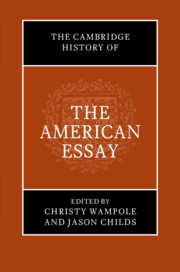Book contents
- The Cambridge History of the American Essay
- The Cambridge History of the American Essay
- Copyright page
- Contents
- Acknowledgments
- Notes on Contributors
- Introduction
- Part I The Emergence of the American Essay (1710–1865)
- Part II Voicing the American Experiment (1865–1945)
- Part III Postwar Essays and Essayism (1945–2000)
- 20 The Essay and the Twentieth-Century Literary Magazine
- 21 Germans in Amerika: Written Possibility, Uninhabitable Reality
- 22 The Essay and the American Left
- 23 The Native American Essay
- 24 Conservatism and the Essay
- 25 Opinions and Decisions: Legal Essays
- 26 World War Two to #MeToo: The Personal and the Political in the American Feminist Essay
- 27 Self-Portraits in a Convex Mirror: The Essay in American Poetry
- 28 The American Essay and (Social) Science
- 29 Philosophy as a Kind of Writing
- 30 The Essay and Literary Postmodernism: Seriousness and Exhaustion
- Part IV Toward the Contemporary American Essay (2000–2020)
- Recommendations for Further Reading
- Index
20 - The Essay and the Twentieth-Century Literary Magazine
from Part III - Postwar Essays and Essayism (1945–2000)
Published online by Cambridge University Press: 28 March 2024
- The Cambridge History of the American Essay
- The Cambridge History of the American Essay
- Copyright page
- Contents
- Acknowledgments
- Notes on Contributors
- Introduction
- Part I The Emergence of the American Essay (1710–1865)
- Part II Voicing the American Experiment (1865–1945)
- Part III Postwar Essays and Essayism (1945–2000)
- 20 The Essay and the Twentieth-Century Literary Magazine
- 21 Germans in Amerika: Written Possibility, Uninhabitable Reality
- 22 The Essay and the American Left
- 23 The Native American Essay
- 24 Conservatism and the Essay
- 25 Opinions and Decisions: Legal Essays
- 26 World War Two to #MeToo: The Personal and the Political in the American Feminist Essay
- 27 Self-Portraits in a Convex Mirror: The Essay in American Poetry
- 28 The American Essay and (Social) Science
- 29 Philosophy as a Kind of Writing
- 30 The Essay and Literary Postmodernism: Seriousness and Exhaustion
- Part IV Toward the Contemporary American Essay (2000–2020)
- Recommendations for Further Reading
- Index
Summary
This chapter begins with the little magazines of the late nineteenth and early twentieth centuries and ends with contemporary online literary magazines, highlighting the radical changes that have taken place as print yielded to digital culture. Motivated by the contrarian personalities of their founding editors against commercial tastes, small-circulation periodicals prioritized aesthetic experimentation and established themselves as an avant-garde force in the arts. During the twentieth century, literary magazines would become institutionalized and relinquish their financial and intellectual independence. Their avant-garde status, once represented by a collectively upheld editorial persona, would become overshadowed by individual cults of personality around popular writers. Magazines’ social programs would become watered down, and instead writers would make themselves into social actors. The arrival of New Journalism in the 1960s and ’70s radically changed long-form journalism, rendering it more literary. The chapter ends with the contemporary literary magazine ecosystem, showing that what magazines have lost in materiality, they have gained in generic hybridity and global access.
Keywords
- Type
- Chapter
- Information
- The Cambridge History of the American Essay , pp. 337 - 360Publisher: Cambridge University PressPrint publication year: 2023



